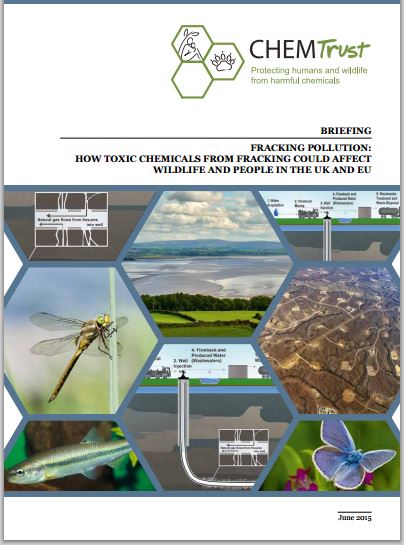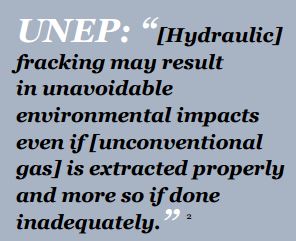Briefing: FRACKING POLLUTION: HOW TOXIC CHEMICALS FROM FRACKING COULD AFFECT WILDLIFE AND PEOPLE IN THE UK AND EU by Dr Michael Warhurst and Gwen Buck, June 2015, CHEMTrust
Click on cover to access complete report.
…
Our key recommendations are:
1) All chemicals used in fracking must be disclosed, with no provision for commercial confidentiality.
2) Stronger EU regulation of fracking is required, ensuring that Environmental Impact Assessments (EIA) are required for all sites, chemical use is controlled and transparent, effective monitoring is obligatory and wastewater management is safe, including an absolute ban on disposal of wastewater by re-injection into the ground.
3) Regulations must protect the environment and people even when fracking wells are no longer used, including financial bonds to cover clean-up costs.
4) Effective monitoring and enforcement is essential to ensure that regulatory controls are followed. This means that regulators must have the resources to carry out these functions; this is a particular concern in the UK where the Environment Agency (EA) is experiencing substantial budget cuts.
In CHEM Trust’s view there should be an EU-wide moratorium on fracking until all our recommendations (see end of briefing) are in place. …
[Why are so many wrongly defining fracing?]
High-volume horizontal hydraulic fracturing, or ‘fracking’ is a way of releasing oil or gas resources that are trapped in shale rocks, coal seams and deposits.
[“Fracking” or high volume hydraulic fracturing causing significant contamination and harm is also done on slant, deviated and vertical wells] …
…
[All the more reason to follow France and New York State]
…
Chemical disclosure
• There must be full public disclosure of all the chemicals used, with adequate
data on their hazard profiles, and clear, publicly available, assessment
of all the potential health and environmental effects. There should be no
opportunity for industry to withhold chemical identities based on claimed
commercial confidentiality.
• Manufacturers and distributers of chemicals must produce and communicate
human and environmental exposure scenarios for fracking substances. These exposure scenarios should be publicly available, and must make clear what are the assumptions made in calculating adequate control, for example, with respect to the storage and fate of flowback. …
Regulators
• The regulation and monitoring of a large number of fracking wells will be a
challenge for regulators. There must be sufficient staff and resources to do
this job effectively. This is a particular concern in the UK, where the staffing
of regulators such as the EA has been reducing in recent years.
• It is also vital that regulators have sufficient expertise in the full range of
issues relevant to fracking, including, for example, the safety of wells. [ Why ask for regulation and monitoring when the EU and UK are deregulating as fast as they can to accommodate industry’s demands of legally immune, unaccountable, “no duty of care,” frac-harm-loaded free-for-all?]
Location
• The vulnerability of ground waters to pollution from fracking should be
recognised and there should be no operations in groundwater source
protection zones.
… [Emphasis added]
Chemicals from fracking could cause significant pollution and damage to wildlife by Michael Warhurst, June 20, 2015, ChemTrust.org.uk
A new analysis for chemicals charity CHEM Trust finds that chemicals from fracking sites have the potential to cause significant pollution [1]. This pollution with hazardous chemicals could cause damage to sensitive ecosystems, including killing wildlife, as has happened in the US. Important UK wildlife sites are threatened, which could harm a wide range of species such as butterflies, dragonflies and bats.
CHEM Trust makes 18 recommendations for vital improvements that are needed in the regulation of fracking in order to reduce risks to the environment and human health. In addition, it warns that cuts in regulators such as the Environment Agency in the UK could jeopardise the effectiveness of any regulations [2].
This publication comes days before Councillors in Lancashire, in North West England, vote on whether to permit Cuadrilla to frack two sites [3], which could potentially affect wildlife in and around Morecambe Bay, a wetland of international importance under the Ramsar convention [4]. CHEM Trust is sending our report to the key Councillors in Lancashire prior to this vote.
The European Commission is also currently considering the effectiveness of the current regulations on fracking [5], and CHEM Trust will be sending our report to the EU’s Environment Commissioner and key Members of the European Parliament, in order to push for stronger regulation. We have already met officials in the EU’s environment department to call for tighter controls on chemical use in fracking operations.
… CHEM Trust Executive Director Dr Michael Warhurst said:
“Widespread fracking will threaten many of our valuable wildlife sites, as this technology has a high potential to pollute sensitive aquatic ecosystems; it can also harm human health. We know from experience in the USA that fracking wells can leak and accidents can happen, and this has led to significant pollution and damage to wildlife.
Given the risks, CHEM Trust is calling for a moratorium on fracking in Europe until all our recommendations are in place.
As part of this, the UK and other governments, must ensure that regulators have the resources necessary to oversee what could be a huge number of wells.
We don’t want to look back in the future to realise that we have damaged our precious countryside in a headlong rush to extract fossil fuels.”
Key recommendations include:
1) All chemicals used in fracking must be disclosed, with no provision for commercial confidentiality; this information should include the guidance on how the chemicals should be used.
2) Stronger EU regulation of fracking is required, ensuring that Environmental Impact Assessments (EIA) are required for all sites, chemical use is controlled and transparent, effective monitoring is obligatory and wastewater management is safe, including an absolute ban on disposal of wastewater by re-injection into the ground.
3) Regulations must protect the environment and people even when fracking wells are no longer used, including financial bonds to cover clean-up costs.
4) Effective monitoring and enforcement is essential to ensure that regulatory controls are followed. This means that regulators must have the resources to carry out these functions; this is a particular concern in the UK where the Environment Agency (EA) is experiencing substantial budget cuts. The Environment Agency is already working to reduce the amount of work it does on individual sites, having just finished a consultation on standardised permits for a wide range of fracking-related exploratory activities [7]. The need for tight regulation was shown in Denmark in May, when the regulator closed down the country’s only fracking site for a week due to use of an unauthorised chemical [8].
Given the potential for pollution and damage to ecosystems, CHEM Trust is calling for a moratorium on fracking in Europe until all our recommendations are in place [9].
Notes
[1] CHEM Trust has today released a detailed briefing, “Fracking Pollution: How toxic chemicals from fracking could affect wildlife and people in the UK and EU” and a comprehensive report “Chemical Pollution from Fracking”, both available fromwww.chemtrust.org.uk/fracking
[2] The Environment Agency (EA) lost around 15% of its staff in 2014, and further cuts are expected as the Government reduces the budget of the Department for the Environment, Farming and Rural Affairs (DEFRA). The EA is also pressure to focus resources on flood defence, rather than environmental regulation. e.g. see: http://www.endsreport.com/41653/environment-agency-cuts-surviving-the-surgeons-knife
[3] Councillors are due to vote on 23rd and 25th June. See: Cuadrilla wins partial backing for Lancashire fracking, The Guardian, 15th June 2015,ttp://www.theguardian.com/environment/2015/jun/15/cuadrilla-wins-partial-backing-for-lancashire-fracking
[4] The Ramsar Convention is an international treaty for the conservation and sustainable utilization of wetlands of international importance, see http://www.ramsar.org
[5] The European Commission will organize a Stakeholder event on 29th June in Brussels – which CHEM Trust will attend – on the effectiveness of the current Commission policy approach to unconventional fossil fuels. http://ec.europa.eu/environment/integration/energy/uff_news_en.htm
[6] Hormone disrupting chemicals are chemicals that can interfere with the endocrine or hormone system – the body’s own sensitive chemical messaging system.hormone disrupting chemicals. For more details see: http://www.chemtrust.org.uk/what-are-hormone-disrupting-chemicals-or-endocrine-disrupting-chemicals-edcs/
[7] Standard Rules Consultation No.11 – new standard rules for onshore oil and gas activities, Environment Agency; closed 15th June 2015, https://consult.environment-agency.gov.uk/portal/ho/ep/src/newrules/oilandgas
[8] Denmark to allow Total to reopen fracking site, thelocal.dk, 13th May 2015
http://www.thelocal.dk/20150513/denmark-to-allow-total-to-resume-fracking-project
[9] CHEM Trust’s full list of recommendations are given in our detailed briefing, “Fracking Pollution: How toxic chemicals from fracking could affect wildlife and people in the UK and EU” available from www.chemtrust.org.uk/fracking; they are also on-line here
Fracking poses ‘significant’ risk to humans, A major scientific study says the process uses toxic and carcinogenic chemicals by Andy Rowell, June 20, 2015, The Independent
A major new scientific study has concluded that the controversial gas extraction technique known as fracking poses a “significant” risk to human health and British wildlife, and that an EU-wide moratorium should be implemented until widespread regulatory reform is undertaken.
The damning report by the CHEM Trust, the British charity that investigates the harm chemicals cause humans and wildlife, highlights serious shortcomings in the UK’s regulatory regime, which the report says will only get worse as the Government makes further budget cuts.
It also warns of severe risks to human health if the new Conservative government tries to fast-track fracking [Is there any place where frac’ing isn’t deregulated and “fast-tracked?” It’s as if companies, corrupt politicians and regulators know communities will yell “No! Stop!” when they find out how severely they are being poisoned. And once the truth is out, intelligent courageous jurisdictions like New York State and France will ban fracing. Thus, they have to frac fast, before people find out the truth] of shale gas across the UK. The “scale of commercial fracking” unleashed by the Government’s eagerness to exploit the technique “should not be underestimated”, it cautions. [Just look to Australia, USA, Canada for examples of that horrendous scale]
The report is due to be published tomorrow – in the week that Lancashire county council votes on two highly contentious planning applications to frack in the county by the company Cuadrilla. If approved, they will be the first commercial fracking sites in the UK. Last week, council planning officers recommended approval of fracking at one site, Preston New Road, but opposed a second site, Roseacre Wood, but only on traffic concerns, not pollution from fracking itself.
The charity says it will send copies of the report to the Lancashire councillors before they vote.
Late last year, New York became the first US state with significant shale gas reserves to ban fracking for health reasons. Howard Zucker, New York’s acting health commissioner, said he had identified “significant” public health risks and the state’s governor, Andrew Cuomo, compared fracking to passive smoking, a practice that wasn’t understood as a health risk for many years.
The CHEM Trust report also focuses on the potential health effects of the hundreds of chemicals, along with sand and water, that fracking companies use to prise open rocks. It warns of “significant” pollution to air, groundwater and surface waters and threats to wildlife. Some of these toxic chemicals have been linked to breast, prostate and testicular cancer in humans as well as coronary heart disease, the report says. It outlines how 38 fracking chemicals are “acutely toxic for humans” and a further 20 are mutagenic, or known or possible carcinogens.
The report gives specific examples of hazardous materials used in fracking, including chemicals “associated with leukaemia in humans” and “toxic to sperm production in males”. The trust warns it is “particularly concerned about the use of hormone-disrupting chemicals”.
It is also asking for full disclosure of the chemicals that will be used in the fracking process. Many of the chemicals used in the process remain secret. In the US, nearly 300 products used in fracking fluids contain at least one secret chemical.
The report warns of concerns about “the current regulation of fracking” in the UK, which has “weak points”. Since the passage of the Infrastructure Bill last year, “it is no longer clear how well groundwaters will be protected”. It is particularly concerned that “ongoing cuts in regulatory authorities” will only make matters worse, especially any cuts to the regulator, the Environment Agency, which lost 15 per cent of its staff last year. [Deregulation – all the better to frac the UK with. Companies can’t profit from fracing with regulations in place and enforced, thus the massive deregulation everywhere fracing is taking place, or planned.]
Specific issues about fracking in Lancashire are raised, including the suggestion that fracking could harm wildlife in the Wyre estuary, which is a Site of Special Scientific Interest, home to 11 wading bird species of international importance and three of national importance, as well as important orchids and insects. “There is clear potential for fracking to cause serious pollution incidents with major impacts on the UK especially areas of recognised wildlife interest” the study concludes. [Then why ask for regulation!?]
The report makes numerous recommendations to protect health, groundwater and the British countryside. These include no fracking operations near drinking water aquifers, the undertaking of environmental impact assessments for all fracking sites, and effective monitoring even after fracking operations have stopped. [Who will pay for that? Companies? Regulators? Greedy, bankrupt, corrupt, cover-up governments? The families harmed by fracing?]
Dr Michael Warhurst, the executive director of CHEM Trust, said: “Our investigation has identified key problems with the way fracking is regulated and monitored. Given the potential for pollution and damage to ecosystems, CHEM Trust is calling for a moratorium on fracking in Europe until our recommendations are in place”.
A spokesperson for the Environment Agency said: “We take the environmental risks associated with oil and gas exploration and production very seriously, including hydraulic fracturing for shale gas, and are committed to ensuring that people and the environment are protected. [Being committed means nothing. Promises of commitment and “best in the world” does not translate into regulation, enforcement, appropriate data collection/monitoring (ask Dr. John Cherry) or protection]
“Our regulatory controls are in place to protect people and the environment.” [Really? What about the massive deregulation by Cameron, with lots more deregulation and rights decimation planned? [Emphasis added]
2015 06 21: Gove plans freedom of information crackdown Michael Gove, the justice secretary, is considering making it more difficult to procure information from government bodies, including allowing officials to count “thinking time” when calculating how much it costs to retrieve information. One plan is to make it easier for ministers to veto publication of certain documents…. Another is to change the way the cost of finding information is calculated so that officials can more readily turn down requests. Maurice Frankel, director of the UK Campaign for Freedom of Information, warned that freedom of information was “coming under a two-pronged attack”. He said: “Many of the proposals . . . could have had severe consequences for the right to know.” [Including access to frac chemicals, contamination cases]
[Refer also to:
Studies Overwhelmingly Show Public Health Hazards and Risks
Health Professionals Urge Governor Cuomo to Enact 3-5 Year Moratorium on Fracking given Scientific Studies and Trends
2014 12: The first is a new working paper analysis from the energy science organization, PSE Healthy Energy. Covering a wide range of outcomes—air pollution, water contamination, and public health—the PSE Healthy Energy analysis is a statistical evaluation of the approximately 400 peer-reviewed studies to date on the impacts of fracking.
Among the key findings:
- 96% of all studies published on health impacts indicate potential risks or adverse health outcomes.
- 87% of original research studies published on health outcomes indicate potential risks or adverse health outcomes.
- 95% of all original research studies on air quality indicate elevated concentrations of air pollutants.
- 72% of original research studies on water quality indicate potential, positive association, or actual incidence of water contamination.
- There is an ongoing explosion in the number of peer-reviewed publications on the impacts of shale or tight gas developments: approximately 73% of all available scientific peer-reviewed papers have been published in the past 24 months, with a current average of one paper published each day.
Anthony Ingraffea, PhD, Dwight C. Baum Professor of Engineering, Cornell University, said, “In 2008*, when New York State first declared a moratorium on fracking, only six peer-reviewed papers on the health and environmental impacts had been published. Now there are more than 400, and the vast majority show a clear and present danger. What’s more, many problems are unfixable by regulations of any kind. …”
[Emphasis added, as of June 21, 2015, there are now over 550 peer-reviewed papers published, still with most showing a “clear and present danger.”]
…




